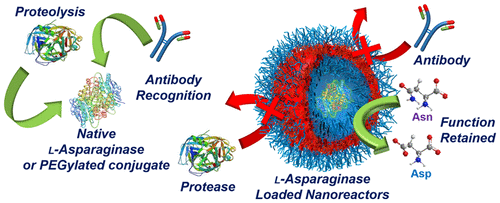当前位置:
X-MOL 学术
›
ACS Cent. Sci.
›
论文详情
Our official English website, www.x-mol.net, welcomes your
feedback! (Note: you will need to create a separate account there.)
Confinement of Therapeutic Enzymes in Selectively Permeable Polymer Vesicles by Polymerization-Induced Self-Assembly (PISA) Reduces Antibody Binding and Proteolytic Susceptibility
ACS Central Science ( IF 12.7 ) Pub Date : 2018-05-16 00:00:00 , DOI: 10.1021/acscentsci.8b00168 Lewis D Blackman 1 , Spyridon Varlas 1, 2 , Maria C Arno 1, 2 , Zachary H Houston 3, 4, 5 , Nicholas L Fletcher 3, 4, 5 , Kristofer J Thurecht 3, 4, 5 , Muhammad Hasan 1, 6 , Matthew I Gibson 1, 6 , Rachel K O'Reilly 1, 2
ACS Central Science ( IF 12.7 ) Pub Date : 2018-05-16 00:00:00 , DOI: 10.1021/acscentsci.8b00168 Lewis D Blackman 1 , Spyridon Varlas 1, 2 , Maria C Arno 1, 2 , Zachary H Houston 3, 4, 5 , Nicholas L Fletcher 3, 4, 5 , Kristofer J Thurecht 3, 4, 5 , Muhammad Hasan 1, 6 , Matthew I Gibson 1, 6 , Rachel K O'Reilly 1, 2
Affiliation

|
Covalent PEGylation of biologics has been widely employed to reduce immunogenicity, while improving stability and half-life in vivo. This approach requires covalent protein modification, creating a new entity. An alternative approach is stabilization by encapsulation into polymersomes; however this typically requires multiple steps, and the segregation requires the vesicles to be permeable to retain function. Herein, we demonstrate the one-pot synthesis of therapeutic enzyme-loaded vesicles with size-selective permeability using polymerization-induced self-assembly (PISA) enabling the encapsulated enzyme to function from within a confined domain. This strategy increased the proteolytic stability and reduced antibody recognition compared to the free protein or a PEGylated conjugate, thereby reducing potential dose frequency and the risk of immune response. Finally, the efficacy of encapsulated l-asparaginase (clinically used for leukemia treatment) against a cancer line was demonstrated, and its biodistribution and circulation behavior in vivo was compared to the free enzyme, highlighting this methodology as an attractive alternative to the covalent PEGylation of enzymes.
中文翻译:

通过聚合诱导自组装 (PISA) 限制选择性渗透聚合物囊泡中的治疗性酶可降低抗体结合和蛋白水解敏感性
生物制剂的共价聚乙二醇化已被广泛用于降低免疫原性,同时提高体内稳定性和半衰期. 这种方法需要共价蛋白质修饰,创造一个新的实体。另一种方法是通过封装到聚合物囊泡中进行稳定化。然而,这通常需要多个步骤,并且分离需要囊泡是可渗透的以保持功能。在这里,我们展示了使用聚合诱导自组装 (PISA) 来一锅合成具有尺寸选择性渗透性的治疗性载酶囊泡,使封装的酶能够在受限区域内发挥作用。与游离蛋白或聚乙二醇化偶联物相比,该策略增加了蛋白水解稳定性并减少了抗体识别,从而降低了潜在的给药频率和免疫反应的风险。最后,封装l的功效- 天冬酰胺酶(临床上用于白血病治疗)对癌症线进行了证明,并将其在体内的生物分布和循环行为与游离酶进行了比较,突出了这种方法作为酶共价聚乙二醇化的有吸引力的替代方法。
更新日期:2018-05-16
中文翻译:

通过聚合诱导自组装 (PISA) 限制选择性渗透聚合物囊泡中的治疗性酶可降低抗体结合和蛋白水解敏感性
生物制剂的共价聚乙二醇化已被广泛用于降低免疫原性,同时提高体内稳定性和半衰期. 这种方法需要共价蛋白质修饰,创造一个新的实体。另一种方法是通过封装到聚合物囊泡中进行稳定化。然而,这通常需要多个步骤,并且分离需要囊泡是可渗透的以保持功能。在这里,我们展示了使用聚合诱导自组装 (PISA) 来一锅合成具有尺寸选择性渗透性的治疗性载酶囊泡,使封装的酶能够在受限区域内发挥作用。与游离蛋白或聚乙二醇化偶联物相比,该策略增加了蛋白水解稳定性并减少了抗体识别,从而降低了潜在的给药频率和免疫反应的风险。最后,封装l的功效- 天冬酰胺酶(临床上用于白血病治疗)对癌症线进行了证明,并将其在体内的生物分布和循环行为与游离酶进行了比较,突出了这种方法作为酶共价聚乙二醇化的有吸引力的替代方法。











































 京公网安备 11010802027423号
京公网安备 11010802027423号